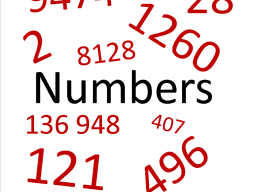Natural numbers
Find the number of all natural numbers greater than 200 in which the digits 1, 2, 4, 6, 8 occur at most once and not contains any other digits.
Final Answer:

Showing 1 comment:
Dr. Math
Think carefully about how to count all natural numbers greater than 200 that are made up only of the digits 1, 2, 4, 6, and 8, with each of these digits appearing at most once in any given number.
We need to find how many natural numbers greater than 200 can be formed using only the digits from the set {1, 2, 4, 6, 8}, where each digit in this set appears at most once in any number.
Important Notes:
1. Digits Used: Only 1, 2, 4, 6, and 8 can be used. No other digits (like 0, 3, 5, 7, 9) are allowed.
2. No Repeats: Each of these digits can appear at most once in a number. So, numbers like 224 or 121 are invalid because digits 2 and 1 repeat, respectively.
3. Greater than 200: The numbers must be greater than 200. This affects the possible numbers based on their digit length.
Given that we can only use the digits {1, 2, 4, 6, 8}, and each digit can be used at most once, the numbers we can form will have lengths from 1 digit up to 5 digits (since there are only 5 unique digits available).
However, since the numbers must be greater than 200, let's consider the possible lengths:
- 3-digit numbers: These range from 100 to 999 in general, but with our digits, the smallest is 124 and the largest is 864 (or similar permutations). Many of these will be greater than 200.
- 4-digit numbers: All 4-digit numbers formed with our digits will be ≥ 1246, which is certainly > 200.
- 5-digit numbers: Similarly, all 5-digit numbers formed will be > 200.
Given that, we need to count all 3-digit, 4-digit, and 5-digit numbers formed under the given constraints.
For a 3-digit number to be greater than 200, its hundreds digit must be 2, 4, 6, or 8 (since 1 would make it 1xx, which is ≤ 199 < 200).
Digits Available: {1, 2, 4, 6, 8}
Hundreds digit (first digit): Must be one of {2, 4, 6, 8} → 4 choices.
Tens digit: Can be any of the remaining 4 digits (since one is already used as the hundreds digit).
Units digit: Can be any of the remaining 3 digits.
So, total 3-digit numbers = 4 (hundreds) × 4 (tens) × 3 (units) = 48.
For 4-digit numbers, all are > 200 (since the smallest is 1246 > 200).
We have 5 digits total, using 4 at a time with no repeats.
Number of 4-digit numbers = number of permutations of 5 digits taken 4 at a time = 5P4 = 5! / (5-4)! = 5 × 4 × 3 × 2 = 120.
For 5-digit numbers, we use all 5 digits exactly once (since no repeats and we have exactly 5 digits).
Number of 5-digit numbers = number of permutations of 5 digits = 5! = 120.
Can we have 6-digit numbers? No, because we only have 5 unique digits, and we can't repeat any to form a 6-digit number under the given constraints.
Now, sum up all valid numbers:
- 3-digit: 48
- 4-digit: 120
- 5-digit: 120
Total = 48 + 120 + 120 = 288.
Understanding the Problem
We need to find how many natural numbers greater than 200 can be formed using only the digits from the set {1, 2, 4, 6, 8}, where each digit in this set appears at most once in any number.
Important Notes:
1. Digits Used: Only 1, 2, 4, 6, and 8 can be used. No other digits (like 0, 3, 5, 7, 9) are allowed.
2. No Repeats: Each of these digits can appear at most once in a number. So, numbers like 224 or 121 are invalid because digits 2 and 1 repeat, respectively.
3. Greater than 200: The numbers must be greater than 200. This affects the possible numbers based on their digit length.
Given that we can only use the digits {1, 2, 4, 6, 8}, and each digit can be used at most once, the numbers we can form will have lengths from 1 digit up to 5 digits (since there are only 5 unique digits available).
However, since the numbers must be greater than 200, let's consider the possible lengths:
- 3-digit numbers: These range from 100 to 999 in general, but with our digits, the smallest is 124 and the largest is 864 (or similar permutations). Many of these will be greater than 200.
- 4-digit numbers: All 4-digit numbers formed with our digits will be ≥ 1246, which is certainly > 200.
- 5-digit numbers: Similarly, all 5-digit numbers formed will be > 200.
Given that, we need to count all 3-digit, 4-digit, and 5-digit numbers formed under the given constraints.
Counting 3-digit Numbers > 200
For a 3-digit number to be greater than 200, its hundreds digit must be 2, 4, 6, or 8 (since 1 would make it 1xx, which is ≤ 199 < 200).
Digits Available: {1, 2, 4, 6, 8}
Hundreds digit (first digit): Must be one of {2, 4, 6, 8} → 4 choices.
Tens digit: Can be any of the remaining 4 digits (since one is already used as the hundreds digit).
Units digit: Can be any of the remaining 3 digits.
So, total 3-digit numbers = 4 (hundreds) × 4 (tens) × 3 (units) = 48.
For 4-digit numbers, all are > 200 (since the smallest is 1246 > 200).
We have 5 digits total, using 4 at a time with no repeats.
Number of 4-digit numbers = number of permutations of 5 digits taken 4 at a time = 5P4 = 5! / (5-4)! = 5 × 4 × 3 × 2 = 120.
Counting 5-digit Numbers
For 5-digit numbers, we use all 5 digits exactly once (since no repeats and we have exactly 5 digits).
Number of 5-digit numbers = number of permutations of 5 digits = 5! = 120.
Can we have 6-digit numbers? No, because we only have 5 unique digits, and we can't repeat any to form a 6-digit number under the given constraints.
Total Count
Now, sum up all valid numbers:
- 3-digit: 48
- 4-digit: 120
- 5-digit: 120
Total = 48 + 120 + 120 = 288.
Tips for related online calculators
See also our permutations calculator.
See also our variations calculator.
Would you like to compute the count of combinations?
See also our variations calculator.
Would you like to compute the count of combinations?
You need to know the following knowledge to solve this word math problem:
combinatoricsnumbersGrade of the word problem
Related math problems and questions:
- Five-digit number count
 Determine the number of all natural numbers greater than 2000 in which the digits 1, 2, 4, 6, and 8 occur at most once each.
Determine the number of all natural numbers greater than 2000 in which the digits 1, 2, 4, 6, and 8 occur at most once each. - Four-digit natural numbers
 Determine the number of all four-digit natural numbers in decimal notation in which the digit 0 is not present, and each of the remaining nine numbers occurs at most once.
Determine the number of all four-digit natural numbers in decimal notation in which the digit 0 is not present, and each of the remaining nine numbers occurs at most once. - Nine-digit numbers
 Determine the number of nine-digit numbers in which each of the digits 0 through 9 occurs at most once and in which the sums of the digits 1 through 3, 3 through 5, 5 through 7, and 7 to the 9th place are always equal to 10. Find the smallest and largest
Determine the number of nine-digit numbers in which each of the digits 0 through 9 occurs at most once and in which the sums of the digits 1 through 3, 3 through 5, 5 through 7, and 7 to the 9th place are always equal to 10. Find the smallest and largest - Six-digit primes
 Find all six-digit prime numbers that contain each one of digits 1,2,4,5,7, and 8 just once. How many are there?
Find all six-digit prime numbers that contain each one of digits 1,2,4,5,7, and 8 just once. How many are there? - Two-digit number creation
 Find the number of all two-digit numbers created from digits 1, 2, 3, 4, and 5 that are greater than 24. We can repeat numerals.
Find the number of all two-digit numbers created from digits 1, 2, 3, 4, and 5 that are greater than 24. We can repeat numerals. - Dd 2-digit numbers
 Find all odd 2-digit natural numbers compiled from digits 1; 3; 4; 6; and 8 if the digits are not repeated.
Find all odd 2-digit natural numbers compiled from digits 1; 3; 4; 6; and 8 if the digits are not repeated. - A five-digit
 A five-digit odd number has the sum of all digits (digits) five and contains two zeros. If we move each digit in the number one place to the left and move the first digit to the last place, we get a number 20,988 smaller. Find this unknown five-digit numb
A five-digit odd number has the sum of all digits (digits) five and contains two zeros. If we move each digit in the number one place to the left and move the first digit to the last place, we get a number 20,988 smaller. Find this unknown five-digit numb
